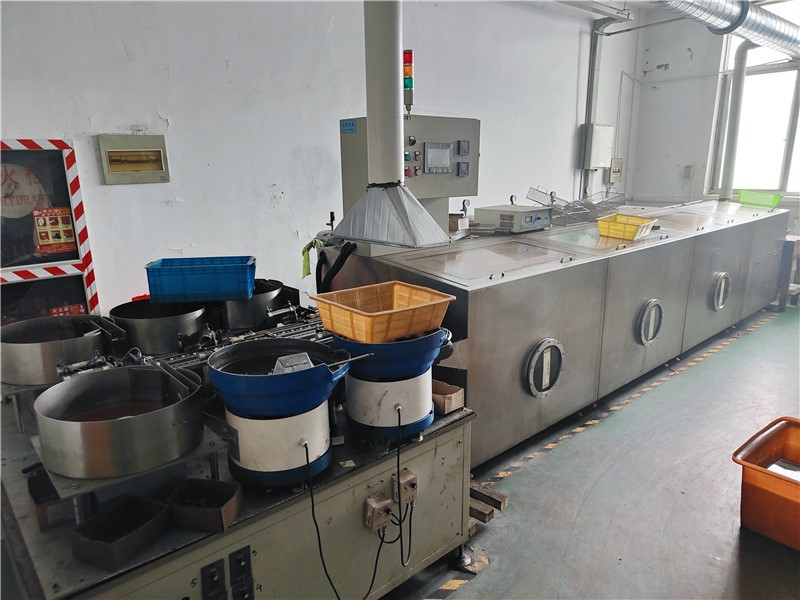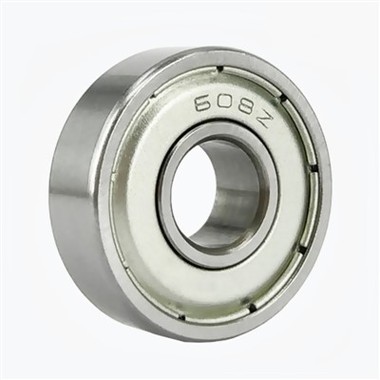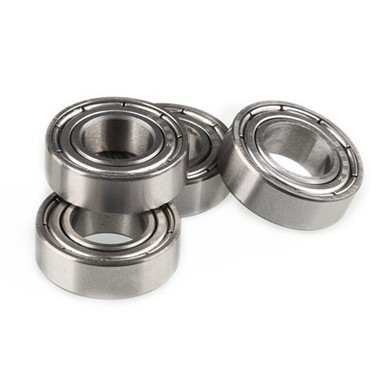Cixi Jieduo Machinery Factory is a professional manufacturer of non-standard customized stainless steel bearings, integrating R&D and design. The company mainly produces various non-standard deep groove stainless steel bearings, stainless steel flange bearings, stainless steel double row cylindrical bearings, stainless steel medical equipment bearings, stainless steel food processing equipment bearings.
Why Choose Us
Our Products
The company mainly produces various non-standard deep groove stainless steel bearings, stainless steel flange bearings, stainless steel double row cylindrical bearings, stainless steel medical equipment bearings, stainless steel food processing equipment bearings.
Our Certificates
The company has passed the ISO9001:2015 international quality system certification. The company has a series of various processing equipment and testing equipment for the production of products that meet the international quality system certification.
Product Application
The company's products are widely used in equipment that requires corrosion resistance, high temperature resistance, and low temperature resistance.
Raw Materials
The raw materials required for the company's products come from professional metal material production plants that meet international standards.
What Is Stainless Steel Bearing
Stainless steel materials are used to make bearing components because it is more resistant to surface corrosion due to the higher content of chromium (~18%) with the addition of nickel. The chromium reacts with oxygen to form a layer of chromium oxide on the surface, creating a passive film.
Benefits of Stainless Steel Bearing
Excellent Corrosion Resistance
Stainless steel bearings are not easy to rust and have strong corrosion resistance.
Can Run In Liquid
Due to the stainless steel material used, bearings and bearing seats can run in liquid.
Washable
Stainless steel bearings can be washed without re-lubricating.
Easy To Clean
The surface of stainless steel is easy to clean.
Slower Drying Speed
Stainless steel does not require oil or grease corrosion protection, so no lubricating oil is required under low speed and load conditions.
High Heat Resistance
Stainless steel bearings are equipped with high-temperature polymer cages or cages without a complete fill structure, and can operate at higher temperatures ranging from 82°C to 350°C. (High-temperature resistant grease is required).
Main Uses of Stainless Steel Bearings
Stainless steel bearings are widely used across various industries due to their corrosion resistance, durability, high mechanical strength and large load capacity. Key applications include:
Food and Beverage Industry
Ideal for environments requiring strict hygiene standards, as they resist corrosion from frequent washdowns and exposure to food substances.
Marine Applications
Used in shipbuilding and offshore equipment for their ability to withstand saltwater and harsh marine conditions.
Medical Equipment
Essential in medical devices for their high cleanliness and resistance to sterilization processes.
Chemical Processing
Suitable for chemical plants due to their resistance to corrosive substances and extreme environments.
Automotive and Aerospace
Used in components exposed to challenging conditions, requiring high durability and reliability.
Types of Stainless-Steel Bearings
In the food industry sector, several types of stainless-steel bearings are commonly used due to their specific characteristics and suitability for various applications. Some of the most prevalent types include:
Stainless Steel Deep Groove Ball Bearings
These bearings are widely utilized in food processing machinery for their versatility, durability, and ability to handle radial and axial loads. They are suitable for various equipment such as mixers, conveyors, pumps, and packaging machines.
Stainless Steel Insert Bearings (Mounted Bearings)
These bearings are designed for easy installation and are commonly used in food conveyor systems, where they provide support and smooth operation. Their resistance to corrosion makes them suitable for applications exposed to moisture and washdowns.
Stainless Steel Spherical Plain Bearings
These bearings accommodate angular misalignment and are utilized in equipment where there are oscillating or tilting movements. They are employed in machinery such as agitators, mixers, and other processing equipment.
Stainless Steel Thrust Bearings
These bearings are engineered to handle axial loads and are employed in applications where there's a need for high load capacities in a limited space. They find use in various food processing machinery, including pumps, gearboxes, and mixers.
Stainless Steel Pillow Block Bearings
These bearings consist of a mounting bracket (pillow block) and a stainless-steel bearing insert. They are commonly used in conveying systems, food packaging machinery, and other applications requiring simple installation and maintenance.
Corrosion-Resistant Stainless Steel Housed Units
These units combine various types of stainless-steel bearings within housings designed to provide additional protection against harsh environmental conditions prevalent in the food industry. They are utilized in diverse equipment across food processing plants.
Stainless Steel Linear Bearings
These bearings facilitate linear motion and are found in equipment like conveyors, slides, and robotic applications within the food industry. Their corrosion resistance and smooth operation make them suitable for hygiene-critical environments.
Heat Treatment Of Bearing Steels

When bearing steels are in their soft (unhardened) state, metallurgists refer to their structure as being in the pearlite state. In order to harden the steel it must be heated to a very high temperature and then cooled very rapidly. When heated in the heat treat furnace to 1,750°F, the structure transforms from pearlite to what is known as austenite. After quenching (very rapid cooling), the structure then transforms from austenite to martensite. Once transformed to martensite, the steel becomes very hard. However, at this point it is not considered "thermally stabilized". This is because not all of the austenite transforms into martensite during the quenching process. This phenomenon is called "retained "austenite".
If the steel is not thermally stabilized, the retained austenite will over an extended period of time (possibly years) transform into martensite. This transformation is accompanied by an increase in volume that is called metallurgical growth (not to be confused with thermal growth). Metallurgical Growth will cause a change in dimension and form of any steel parts such as bearings' even at room temperature.
While not a problem with low precision commodity type bearings, in high precision (ABEC 5P, 7P, 9P) miniature bearings this lack of dimensional stability can cause problems. In order to eliminate this unwanted metallurgical growth, the steel must be subjected to thermal stabilization. This is accomplished by repeated cycles of chilling at -120 F and tempering to transform a large percentage of the retained austenite to martensite.
Calculating and Enhancing Bearing Performance
Load Capacity: Determining the load capacity of a bearing is critical to ensuring it can withstand the anticipated forces. The load capacity is listed in the manufacturers catalog as dynamic load rating (C) and static load rating (Co).
Engineers can calculate the equivalent dynamic load (P) based on the actual load and load distribution. This allows for accurate selection and sizing of bearings to avoid premature failures and optimize performance.
Fatigue Life: Fatigue life represents the ability of a bearing to withstand repeated stress cycles without failure. Fatigue failure is a common concern in rotating machinery. Engineers employ various empirical and analytical methods, to estimate fatigue life. Improving bearing life involves factors like improving surface finish, reducing stress concentrations, and utilizing advanced bearing designs.
Bearings are vital to manufacturing and are used in many different types of equipment and machinery. From basic industrial equipment to complex machinery, bearings reduce friction and enable them to handle different types of loads. Therefore, the use of quality and reliable materials is crucial to the bearing manufacturing process.
Different materials are used to produce various types of high-quality bearings and their many components. These materials are subjected to a specific process to obtain the desired properties that increase the life and performance of the bearing. Teams at AUB can discuss the different materials used in bearing manufacturing and how each affects the bearing’s use, integrity and function.
The performance of any bearing depends on the properties of the chosen alloy and its heat treatment. Selecting a material with the correct hardness, corrosion resistance and fatigue life ensures that the bearing will perform reliably within the operating and environmental parameters of the application. AUB uses different materials to produce various bearing components. These materials are processed to obtain ideal characteristics to maximize bearing performance and service life. The materials described here are the most commonly used. The bearing material is heat treated in-house for optimum hardness and dimensional stability.

Many types of stainless steel alloys are used in the manufacturing of bearings. The best stainless steel for bearings is one that can be easily machined, has high corrosion resistance, and has a low level of magnetic permeability.
When it comes to choosing the best stainless steel for bearings, there are a few factors that you need to consider. The most crucial factor is the bearing you are using and what type of environment it will be in. There are three main types of bearings: rolling element bearings, ball bearings, and tapered roller bearings.
Since a bearing will spend most of its life in an oil bath or grease, the material must resist corrosion. This is why stainless steel is often used in these applications because it has a high resistance to corrosion and oxidation.
It also has high mechanical strength, which makes it perfect for any application where there will be continuous contact with other metal surfaces or fluids.
How to Identify the Quality of Stainless Steel Bearings
Now there are many manufacturers selling stainless steel bearings in the market, and the quality of each manufacturer is uneven. Facing so many choices, how can we choose to buy good stainless steel bearings?
Look at the material. The stainless steel of stainless steel bearings can be seen from their hardness and precision. In this respect, good stainless steel bearings are much higher than inferior stainless steel bearings.
We can observe it with the naked eye. Check whether the inner and outer raceways are in the form of arc grooves, whether there are peeling marks, whether there are cracks and peeling on the rolling surface, and whether the whole framework is loose.
Identify from the feel. Generally, the clearance between the inner and outer rings of a normal stainless steel bearing and the rolling element is not too large. When we shake the inner race with our hands, we check whether it shakes. If it does, it is inferior.
Rotate the stainless steel bearing. If it is not flexible enough and has a sense of obstruction during rotation, or if the stainless steel bearing shakes during rotation, it is also inferior stainless steel bearing.
Maintenance Tips for Stainless Steel Bearing
Handle With Care
Bearings are delicate enough to get damaged quickly. As such, it is very important that they are stored horizontally in a clean and dry environment with their packaging intact. Do not expose them to any airborne contaminants, as even a tiny speck of dirt can cause premature failure. Never hammer or pound them, or apply a direct force on it or its outer ring, which can cause damage to the rolling elements, resulting in misalignment. The most important thing to remember is to never remove bearings from their packaging until ready for use.
Professional Handling
Appropriate tools must be used for the professional handling of bearings. When installing and removing bearings, tools not specially used can cause unnecessary damage, dents and wear.
Proper Lubrication
If you want to have a prolonged life of your bearings, it is crucial that they should be properly lubricated. The correct lubricant depends on the environmental conditions, temperature, speed and load. In this case, it is advisable that you should follow your manufacturer’s recommendations. The use of automatic lubrication systems ensures optimal lubrication for the bearings.
Avoid Preheating Or Overheating
The maximum heating allowed on the bearings depends on the heat treatment of the material. If they are heated above the permitted limit, they can permanently deform or soften the bearing steel, lowering load carrying capacity and resulting in a failure. Always heat the bearings using induction heaters, and never with an open flame.
Avoid Corrosion
It is crucial that you should not expose bearings to the presence of water for a long time, as it will lead to rust and corrosion. It will also cause the premature failure of the bearings, which can affect the machine performance and productivity. As a result, it will increase your operating costs. Also, make sure to wear gloves when handling bearings. Perspiration can also lead to rust and corrosion. In a specifically corrosive environmental choosing the right bearing is crucial. For example, sealed bearings made of stainless steel are often a good choice, even in chemical plants.
Regular Inspection
It is rare for a bearing to fail without any warning signs. Excessive noise, vibration, or an increase in temperature may be a symptom of a deeper problem. If a bearing shows any operational abnormalities, it should be observed more carefully.
Our Factory
The company has a series of various processing equipment and testing equipment for the production of products that meet the international quality system certification. The raw materials required for the company's products come from professional metal material production plants that meet international standards.



FAQ
We're professional stainless steel bearing manufacturers and suppliers in China, specialized in providing high quality products. We warmly welcome you to wholesale customized stainless steel bearing at low price from our factory. Contact us for more cheap products.
5 8 inch steel balls, S625 Bearing, S638 Bearing











